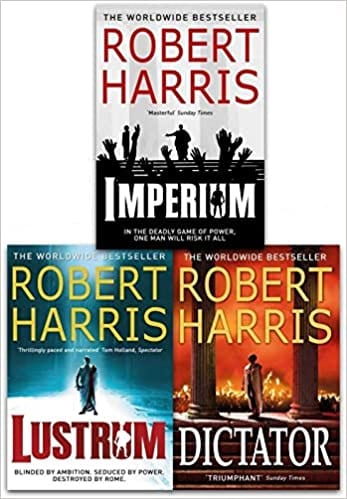Dictator is the third of Robert Harris’ three volumes in the Cicero trilogy. You can buy the volumes separately, but once you read one of them— you’re hooked, and you’ll want to read them all. Harris is a brilliant writer, much better than some of the others who write about ancient Rome, and there are some very good ones indeed— McCullough, Saylor, and the always fun volumes of Lindsey Davis. Harris tells the story of Cicero and the demise of the Republic through the eyes of Tiro, the learned scribe and slave of Cicero, finally manumitted towards the end of Cicero’s life. It is Tiro who really invented ‘tachiagraphy’– or quick writing (i.e. shorthand) and came up with abbreviations and symbols like etc. or et al. or vis a vis or NB and the ampersand &, which we still use today. In this fashion, he could take down Cicero’s speeches in the Senate and law courts verbatim!
The joys in reading this chronicle are numerous, not the least of which is you get an insider’s look at Cicero and the political machinations of that age, where killing or threatening your opponents vying for office was not infrequently a regular tactic. It makes modern political polemics in America look tame by comparison. But then the ancient Romans were under no necessity to behave like those deeply indebted to the Judeo-Christian tradition, much less to the ethics of Jesus or Paul the Roman citizen more specifically. Honor and shame, rather than truth and honesty ruled the roost, and while ‘clementia’ or mercy was praised, more often one came across ‘et tu Brute’– or treachery, and an endless cycle of reprisals— revenge taking in many forms.
These three novels, and particularly this third in the series, is full of quotations from Cicero’s works (Loeb critical edition being used as Harris tells us) and it reminds us of Cicero’s remarkable rhetoric, and ability to produce memorable one liners, puns, quips. For example, we owe to Cicero ‘where there’s life, there’s hope’, for example, or reconciliation is a sign of greatness’. Or more relevant to the growing unemployment in our situation there is his complain about how those on the dole— ‘begin with gratitude, fall into dependency, and then come to have a sense of entitlement’. Cicero makes quite clear that even without the trappings of democracy, the art of persuasion could change a good situation into a bad one or vice versa. Cicero’s was an oral culture where face to face communication orally was primary and written texts were secondary.
I commend these novels to one and all who would really like to understand the nature of the Greco-Roman world into which Paul and his co-workers took the Gospel. These novels are suspenseful, entertaining, informative, well written, and give pleasure in a way a mere reading of a history of the period does not. Highly recommended for those who are serious about understanding the world of the NT.












